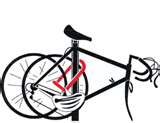Peer Advisor Rachel Earnhardt ’17 wrote this for the incoming Class of 2020, but good advice never gets old!
It was in the Container Store, standing among clearance laundry baskets and desk organizing supplies sometime in early August, that I had a *minor* meltdown about starting college. Somehow, browsing for reasonably priced, but sturdy dorm necessities had made college feel so suddenly imminent and terrifying. If you find yourself having a similar experience, whether it be in Target or Bed Bath & Beyond or anywhere else really, I’m here to say that’s completely normal.
If you are totally chill and prepped and ready for college, then I envy you. Likely though, if you have traversed the internet to find this humble peer advisor blog post titled “Don’t be Nervous,” you are feeling anxious or excited or overwhelmed or some combination about starting college and would like to hear from some “wise” not much older soul who’s been there. I hope you find my personal narrative and unsolicited advice reassuring.
Okay, let’s rewind to the weeks leading up to the Container Store Incident. The summer before my first year at Wesleyan, I had my first real job working as an assistant camp instructor at the natural science museum. For several weeks, I stayed gloriously busy doing bug-themed crafts and making dinosaur footprint cookies and leading nature hikes and deliberating about how long I could avoid washing my staff shirt, but then, abruptly, camp ended. And the whole month of August was empty. It stretched out…a painfully open, unplanned void. This unscheduled month meant that I had four weeks with nothing to do other than think about heading off to college.
Let us rewind a bit more to April of my senior year. I had made an exhaustive spreadsheet, titled “The Decider.” With nearly 25 categories (like food, climate, “do I have to take a math class?”, faculty to student ratio, etc) I had meticulously input data about all the schools to which I had been accepted. I had been blessed with several wonderful options, many very similar to Wesleyan. But after careful analysis, Wes emerged as the clear choice. The last (and most important) category of my spreadsheet was titled “good vibes?” Next to other colleges, I wrote things like “too cold” and “too radical.” By Wesleyan, I had written the succinct, but completely confident: “Yeah.”
Yet still, even though I had penned this definitive assessment and highlighted the Wesleyan column in green on the spreadsheet, sent in my deposit, and bought my “Wesleyan Girls: Making Connecticut Beautiful Everyday” shirt, throughout the month of August, I woke up wondering. Wondering about each of the other schools from my spreadsheet, and even ones that I had not even applied to. For example, I had to remind myself that I crossed colleges in the state of Minnesota off my list for a reason (I’m sure it’s a great state, but I’m from the South and I’ve always just pictured a frozen hellscape). In retrospect, I realize that channeling my energy into my college choice stemmed from a general anxiety about going 900 miles away for school, where I didn’t know anyone.
Side note: It was also in August 2013 that I discovered College Confidential, which is sort of the underbelly of the internet. I stayed up for hours consuming the crowd-sourced anxiety about selecting a school and prepping for college. I also read countless Buzzfeed articles and mediocre blogs about the first year of college. *This was ultimately counterproductive and I do not recommend it.
But back to the story, fast-forwarding a bit to late August. After returning several items purchased in the heat of the moment to the Container Store, I had acquired everything on the packing list (and a bunch of things I didn’t need). We packed the car and began the eleven-hour drive from North Carolina to Connecticut.
I arrived in Middletown the day before move-in and led my parents on a tour of my new home. Draped in the flowers of late summer, the verdant campus was even more welcoming that it had been during our first encounter. (Okay, here comes the corny part): As I stood on the top of Foss hill looking out at College Row under the dome of blue sky, I knew that I would have the incredible opportunity to grow in profound ways over the next four years. I had picked a wonderful place to learn and prepare to make positive impact in the world.
I would be lying if I said that every ounce of anxiety evaporated during the first days or weeks or even months on campus. Eventually, I found my community and I can confidently predict that you will, too. Here is a whole paragraph of encouraging, very sincere reassurance:
If you are wondering if Wesleyan made a mistake admitting you: they didn’t. Or if you made a mistake in choosing it: you didn’t. You are intelligent and capable. You will be surrounded by 780 interesting, smart, creative, idealistic people in your first year class. You will be able to find common ground with plenty of other people (even if you may not find those souls on your hall). It may take a few days or weeks or months, but you will meet friends and find professors with whom you connect. You may get overwhelmed by the coursework or, on the other end of the spectrum, find that some your courses are not what you expected, but there are plenty of people around to commiserate with and more importantly, to provide support and guidance. You will change your mind and your major and likely your haircut several times…and that’s all expected and celebrated!
Because I didn’t know where else to put it—here it is the obligatory list of unsolicited advice about preparing for college/the first few weeks (in no particular order) that you will probably ignore:
- Go to different club meetings and activities. It might take a little time, but you will meet people who share your interests. I don’t want to minimize your unique personality, but there are plenty of other folks who are interested in science AND movies!! And yes, there will be at least one other person interested in starting a band.
- Your hall will likely fuse together for a few days. That’s totally normal. Try to expand a little…Ask people from your classes or activities to lunch or coffee or to the Film Series or a WesBAM class. (Please feel free to contact me for other friend date suggestions.)
- If you are unsure about ANYTHING, reach out to the peer advisors, the RAs, CAPS, OSRL, the deans, your orientation leaders or any the other groovy resources available.
- Orientation specific: Go to all the events! Maybe you feel like you met your new bae or best friend and you will never hang out again if you separate to go to the meetings….but more than likely, you will learn something important at the orientation event.
- Real talk: Across the nation, the first two months of the fall semester see an unsettling spike in alcohol hospitalizations. Please, please take care of each other.
- Your residential advisors and orientation leaders are so excited to welcome you to campus. Maybe you don’t connect with them on a spiritual level and that’s totally fine.
- ******Academics don’t happen in a vacuum. Your emotional, physical and mental well-being are all intimately a part of your experience and affect your ability to succeed (whatever success means to you). ******
So let’s wrap up. You’ll recall several paragraphs ago I explained that in my spreadsheet, by Wesleyan I had written: “Yeah.” I will now artfully use that as a nice frame for this post.
Is there an expansive network of resources and people (students, faculty, staff, peer advisors, the list goes on…) to support you throughout your Wesleyan journey so that you can get the most out your time here and go on to be a thoughtful and engaged citizen? Is the entire Wesleyan community so jazzed to have you join us?
Yeah!!!!!!!
The title of the post is “don’t be nervous,” but I had plenty of people tell me that and I didn’t listen. If you’re nervous, there’s not much I can say to change that. Nervous or not, either way, you will arrive in Middletown… and more than likely you will thrive here.
So, again, if in the next couple weeks you have any moments of doubt or anxiety or maybe you just get so excited you can’t breath, please feel free to reach out to the peer advisors (or one of the many aforementioned resources).
And of course, I invite you to have a last minute existential crisis in your local dorm supply depot. It can be quite cathartic.



 and security measures, and students tend to let their guard down. A majority of the crimes that occur on campus are crimes of opportunity. One area we typically see this is in bicycle thefts. Bicycle thefts have become a growing problem on college campuses and Wesleyan is no exception. If you bring a bike on campus, please keep the following tips in mind:
and security measures, and students tend to let their guard down. A majority of the crimes that occur on campus are crimes of opportunity. One area we typically see this is in bicycle thefts. Bicycle thefts have become a growing problem on college campuses and Wesleyan is no exception. If you bring a bike on campus, please keep the following tips in mind: making a positive impression, a strong email can go a long way. The following is a simple framework from which you can base your own emails.
making a positive impression, a strong email can go a long way. The following is a simple framework from which you can base your own emails. homework or study for tests while swimming nearly year-round. I quickly realized that the key to balancing my time was to make a detailed schedule at the start of every week and stick to it. I would write down everything that needed to be done for each of my classes at the start of the week, include all the time I had committed to training, and make sure I had time to myself to have fun and relax. You would be surprised at how helpful laying out your schedule can be, especially when it feels like there aren’t enough hours in the day to get everything done.
homework or study for tests while swimming nearly year-round. I quickly realized that the key to balancing my time was to make a detailed schedule at the start of every week and stick to it. I would write down everything that needed to be done for each of my classes at the start of the week, include all the time I had committed to training, and make sure I had time to myself to have fun and relax. You would be surprised at how helpful laying out your schedule can be, especially when it feels like there aren’t enough hours in the day to get everything done. administrators, and fellow students engage you in conversation about Citizen: An American Lyric by MacArthur Genius grant-winning poet Claudia Rankine on Friday, September 1 of New Student Orientation.
administrators, and fellow students engage you in conversation about Citizen: An American Lyric by MacArthur Genius grant-winning poet Claudia Rankine on Friday, September 1 of New Student Orientation. elsewhere at the end of the fall semester. Don’t buy your ticket yet! Wait until you know your
elsewhere at the end of the fall semester. Don’t buy your ticket yet! Wait until you know your  in your “Orientation Checklist & Resources,” make sure that you complete and submit it in within the next week. It is a good exercise in processing the past as you think about the future and helps you to focus in on how best to take advantage of your educational opportunities at Wes.
in your “Orientation Checklist & Resources,” make sure that you complete and submit it in within the next week. It is a good exercise in processing the past as you think about the future and helps you to focus in on how best to take advantage of your educational opportunities at Wes.